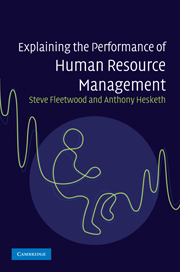7 - Putting critical realism to work
Published online by Cambridge University Press: 05 July 2014
Summary
In the preceding chapters we have made it clear that research based upon scientism (its ontology, epistemology, methodology and aetiology and the quantitative, empirical, statistical techniques it sponsors), has seriously misled research on the HRM–P link. The previous chapter drew upon critical realism to sketch some of the meta-theoretical building blocks on which an alternative approach to research on the HRM–P link might be undertaken in future. This leaves two possible directions for us to travel. One direction would lead us in the direction of undertaking empirical research ourselves, exploring the relation between HRM and organisational performance not via scientism, but via critical realism and the research techniques it sponsors. This direction is not, unfortunately, open to us at the moment. It would, of course, take years to fund, design, undertake and then report upon such empirical research, and we simply did not want to delay publication of the book any further. In any case, the main purpose of this book is to convince the reader that current research on the HRM–P link is flawed and alternatives need to be sought. The other direction is to make use of interviews we carried out with senior HR professionals to ascertain their views on the meta-theory underpinning research on the HRM–P link. This research led us to conclude that many senior HR professionals are not only unhappy with scientism, they are far happier with critical realism as it meshes with their own implicit modus operandi. This is the direction we took.
Most HR professionals are not, of course, experts in meta-theory so the way we approach this research is to use language that they understand. We do not, then, ask them for their ‘views on the deductive method’ or, for that matter, their ‘views on the use of closed system modelling’. We take meta-theoretical concepts, translate them into questions using ‘everyday’ language, then translate the answers, often couched in metaphor, back into meta-theoretical concepts. When, in a particular context our respondents say they ‘lift up the stones and have a look underneath’, we are able to translate this into them saying they retroduce to a mechanism that is causing some phenomena that they seek an explanation to.
- Type
- Chapter
- Information
- Explaining the Performance of Human Resource Management , pp. 267 - 292Publisher: Cambridge University PressPrint publication year: 2010



